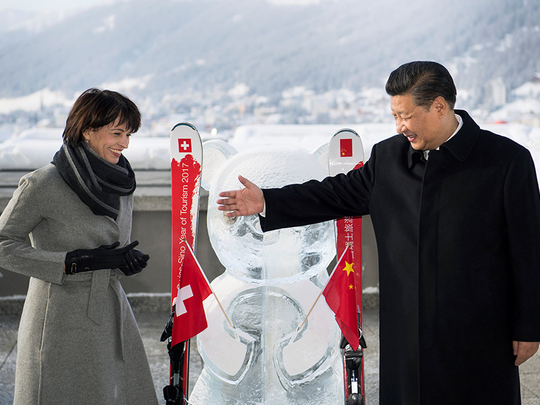
Davos: Chinese President Xi Jinping used his landmark speech at Davos to stake China’s claim to be the guardian of inclusive globalisation, in stark contrast to the protectionism that US President-elect Donald Trump has focused on in the run-up to taking office this week.
Xi did not mention Trump by name, but he was forceful in his defence of continuing the internationally coordinated approach to global governance, based on full awareness that all countries are mutually dependent on each other. He spoke out against nationalist protectionism that Trump has supported, saying “protectionism is like locking yourself in a dark room. The wind and the rain are kept outside, but so is the air and the light”.
Xi dismissed the possibility of any benefits coming from trade wars, saying that “there can be no winner is such a war” as he continued the argument for developing global connectivity to support free trade and investment, and to continue liberalising regulation. And he hit out at Trump’s rhetoric when he said that “multilateralism means that individual states cannot select or bend rules as they want”.
When talking about how to manage development, and improve global governance, Xi bluntly said that “China refuses to be insensitive to changes nor to blindly follow the development paths of others. China follows a people-oriented development plan that suits the reality of our country. It is development of the people by the people for the people”, using a neat phrase borrowed from the US constitution.
Later in the speech, Xi made some specific comments that addressed some US concerns: he opposed creating “fragmented groups” like the Trans Pacific Partnership, TPP, that was backed by Obama but excluded China from this planned free trade area. Xi said that he wasted an inclusive trade zone in the Pacific. He also said that China will not devalue the yuan, which has been the target of Trump’s allegations that China deliberately manipulates its currency to achieve economic benefit, and Xi said that China will not start a trade war, which has been one of Trump’s repeated threats.
Xi made a strong defence of the Paris agreement on climate change that Trump has attacked as a bad deal. “The Paris Agreement must stand,” said Xi. “It is essential for our future generations’ prosperity, and it must stay”.
Overview of globalisation
In his defence of globalisation and its benefits, Xi made clear that many of the world’s ills were not created by globalisation. He said that the millions of refugees and thousands of dead children were not victims of globalisation but of war and conflict. And he added that the global economic crisis was caused by the search for excess profit and poor regulation, not by globalisation.
“Many voices have described the pitfalls of globalisation,” Xi said, “and even if China hesitated to join the World Trade Organisation, it was right to do so. We struggled at first, and then we learnt to swim. We want a more invigorated, inclusive and sustainable global economy.”
Xi listed some global economic problems that need to be addressed. First was the lack of a driving force to sustain growth, with GDP growth under 7 per cent and trade less than that. “Short-term stimulus does not work, and traditional methods are failing. Second was “inadequate global governance which makes it difficult to adapt to change. Emerging markets produce 80 per cent of global growth, but global governance remains closed and fragmentary, and the emerging marks do not have representation or inclusiveness”. Third was uneven global development, in which one per cent of the population owns more wealth than the remaining 99 per cent. “For many families, a warm house, enough food and a secure job is a major challenge, and this is major challenge that globalisation will need to address,” said Xi.
But having listed these issues, Xi went on to offer some answers. First, he pointed out that the recent G20 meeting in China had backed a consensus that put innovation at the heart of economic management, as well as seeking structural reform, more space for growth, and fostering new opportunities.
Second, Xi backed an internationally coordinated approach to governance, which develops global connectivity, free trade, and international investment, and liberalisation. Third was an improved share in governance for all nations. “Big and small, poor and rich, weak and strong, all need to participate, and the emerging markets need a greater voice in the multilateral institutions”, he said. The last point was to address the world’s unbalanced development with a more equitable model that “fosters diligence and frugality”, seeks to eliminate poverty and inequality, and protects the disadvantaged and the environment.
Xi ended with an announcement that China’s One Belt One Road plan to build international trade has attracted 70 participating countries and $50 billion (Dh183 billion) of investment. All the states will be invited to a One Belt One Road Forum which will be held in May this year, as they all review how the benefits can be shared across all the borders.












